Charles E W Bean, Diaries, AWM38 3DRL 606/245/1 - 1915 - 1925 - Part 15
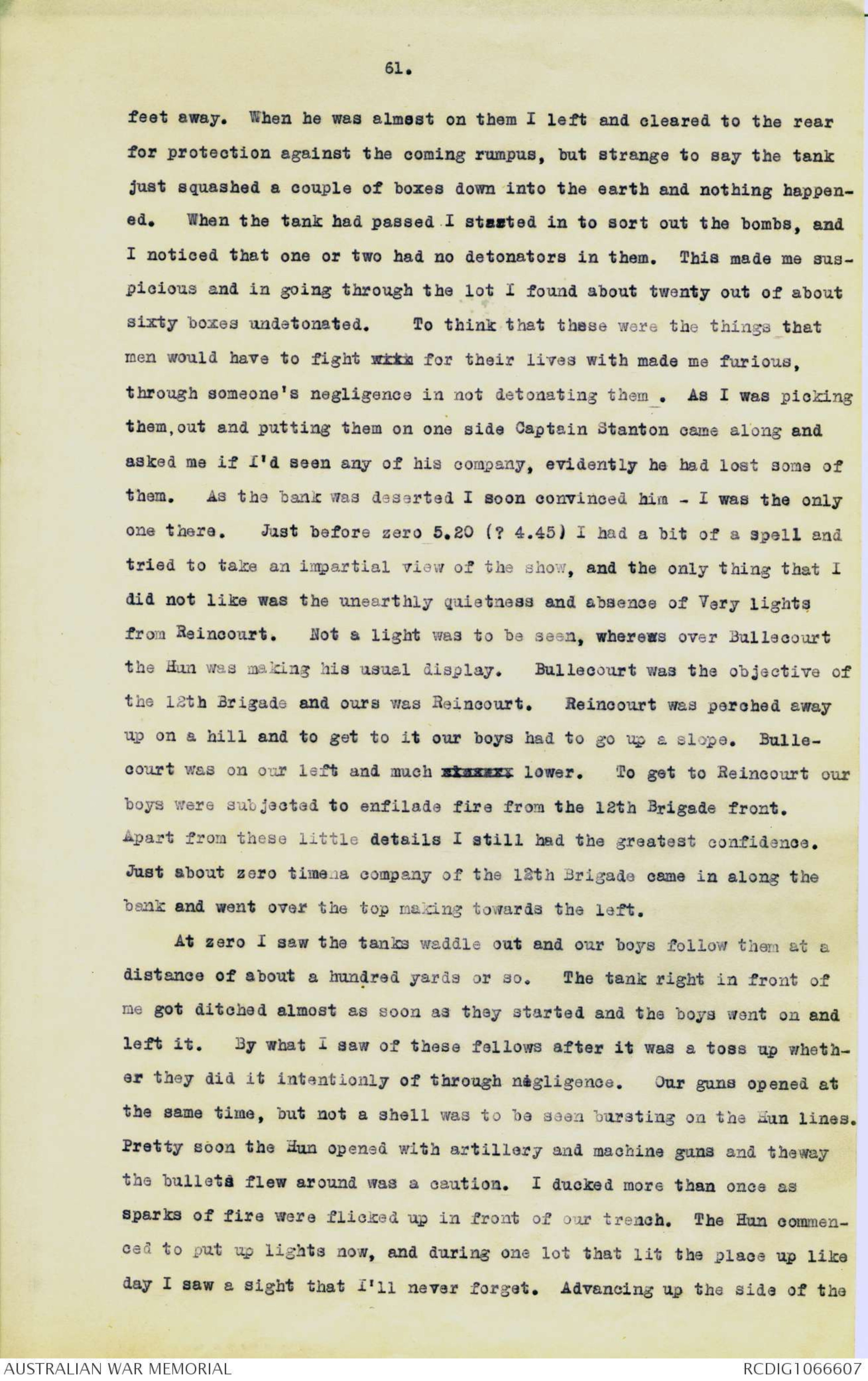
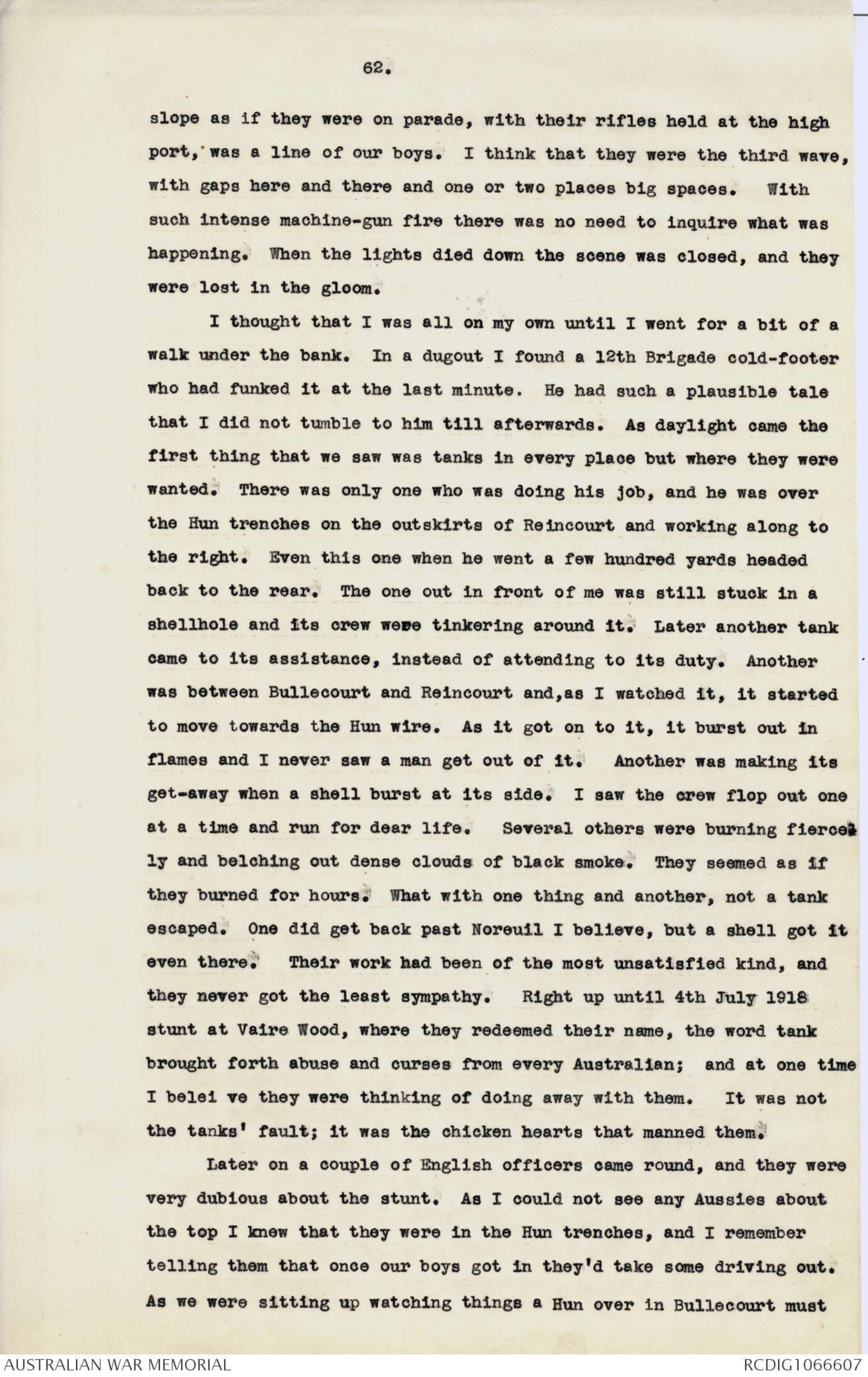
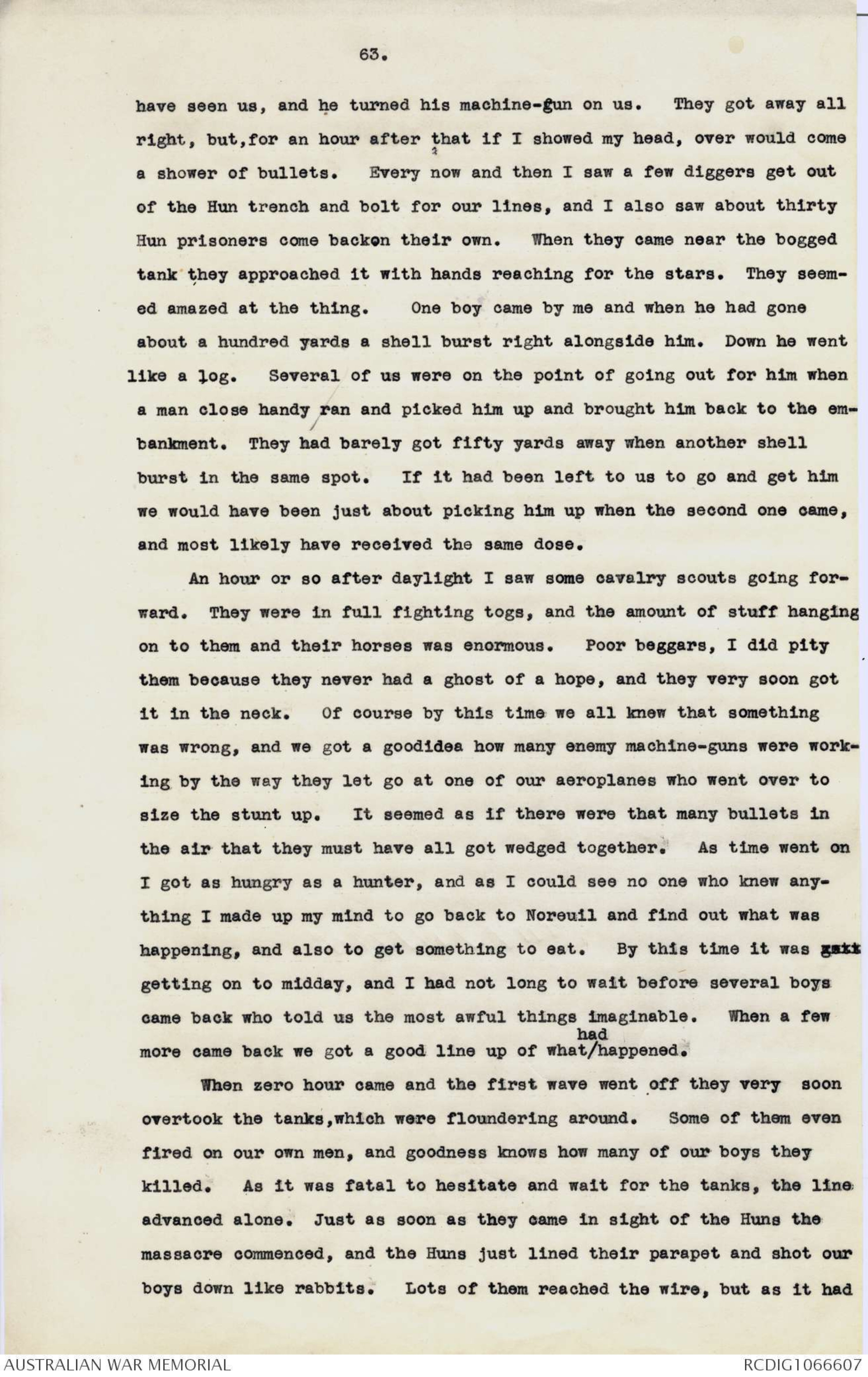
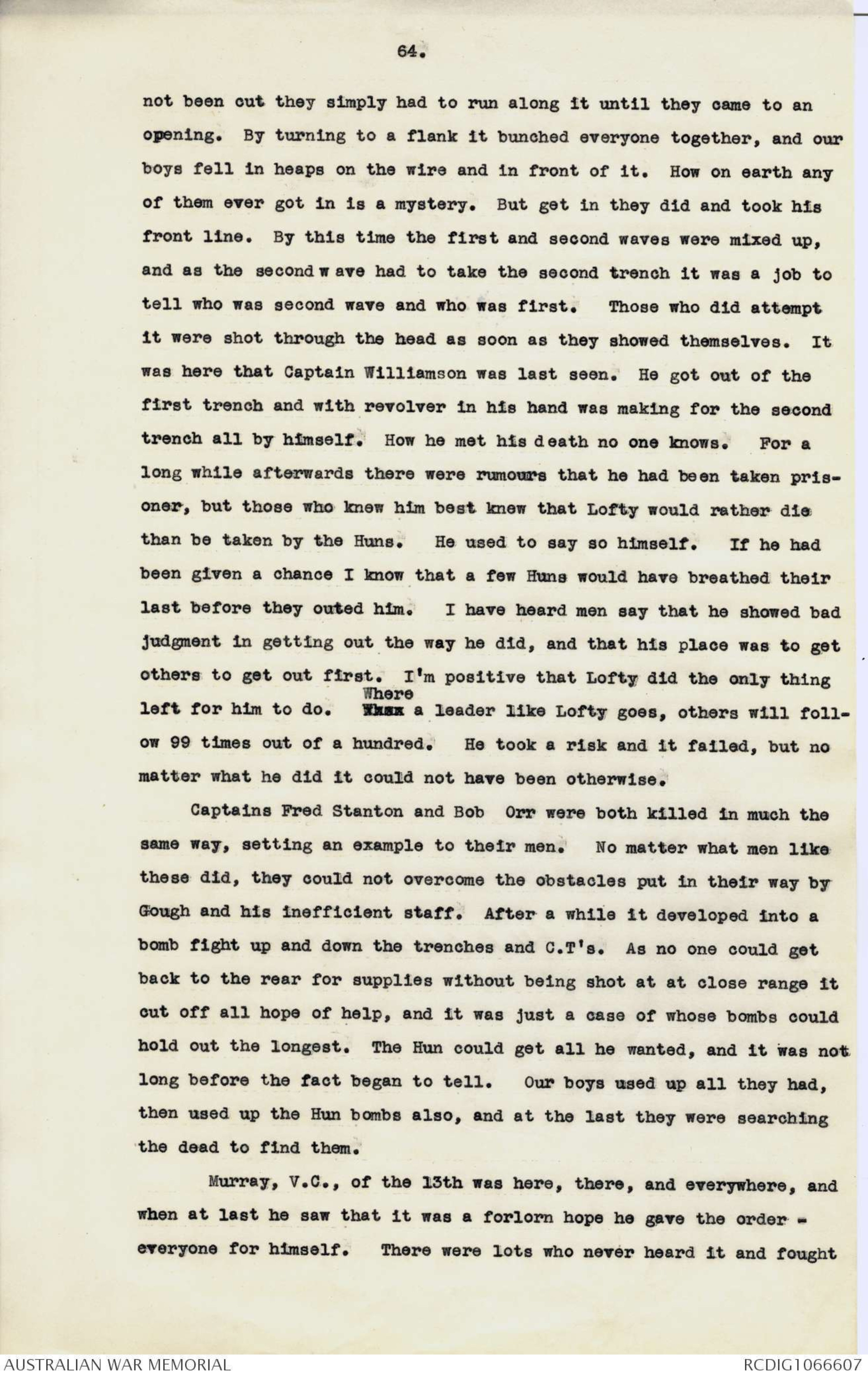
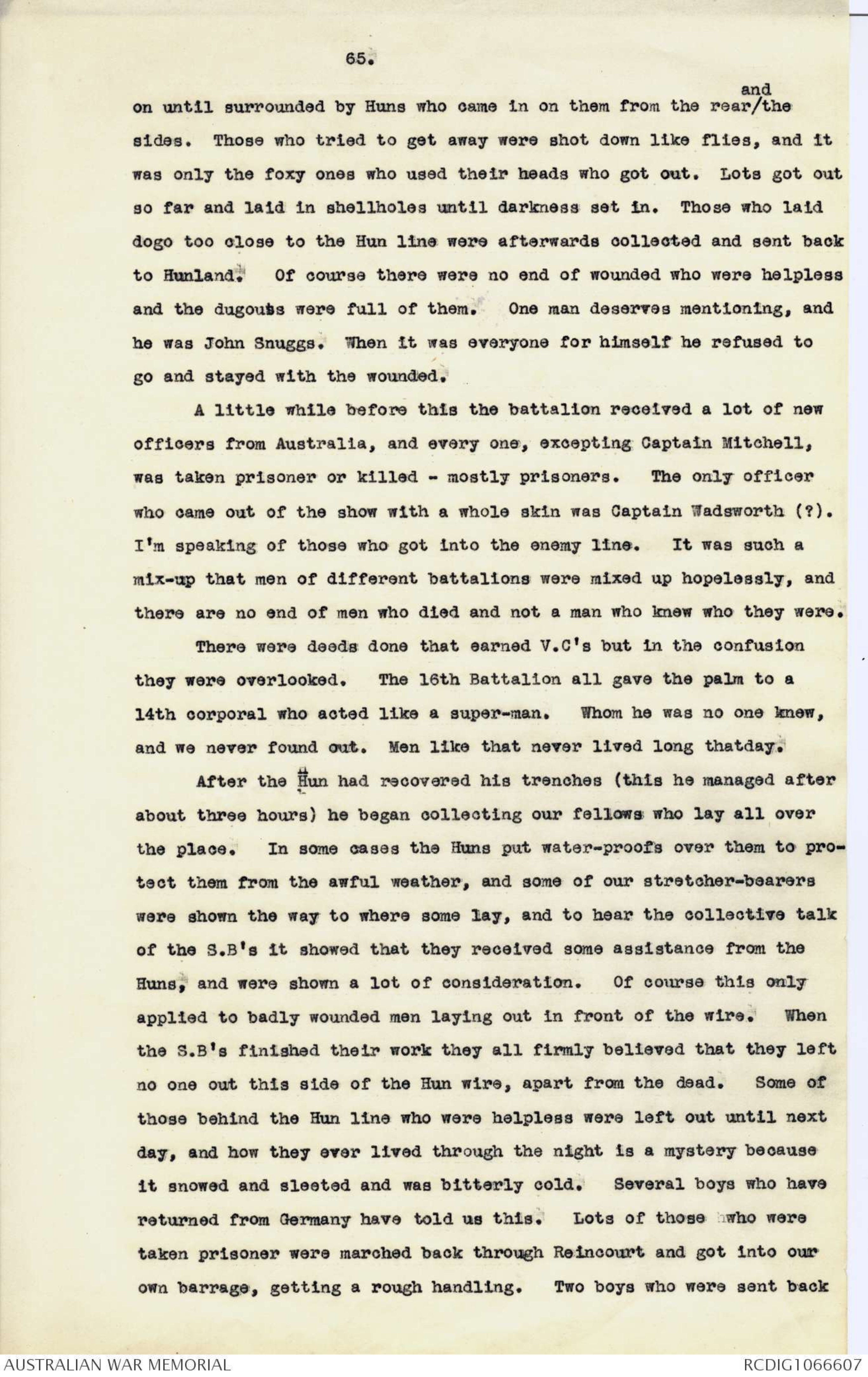
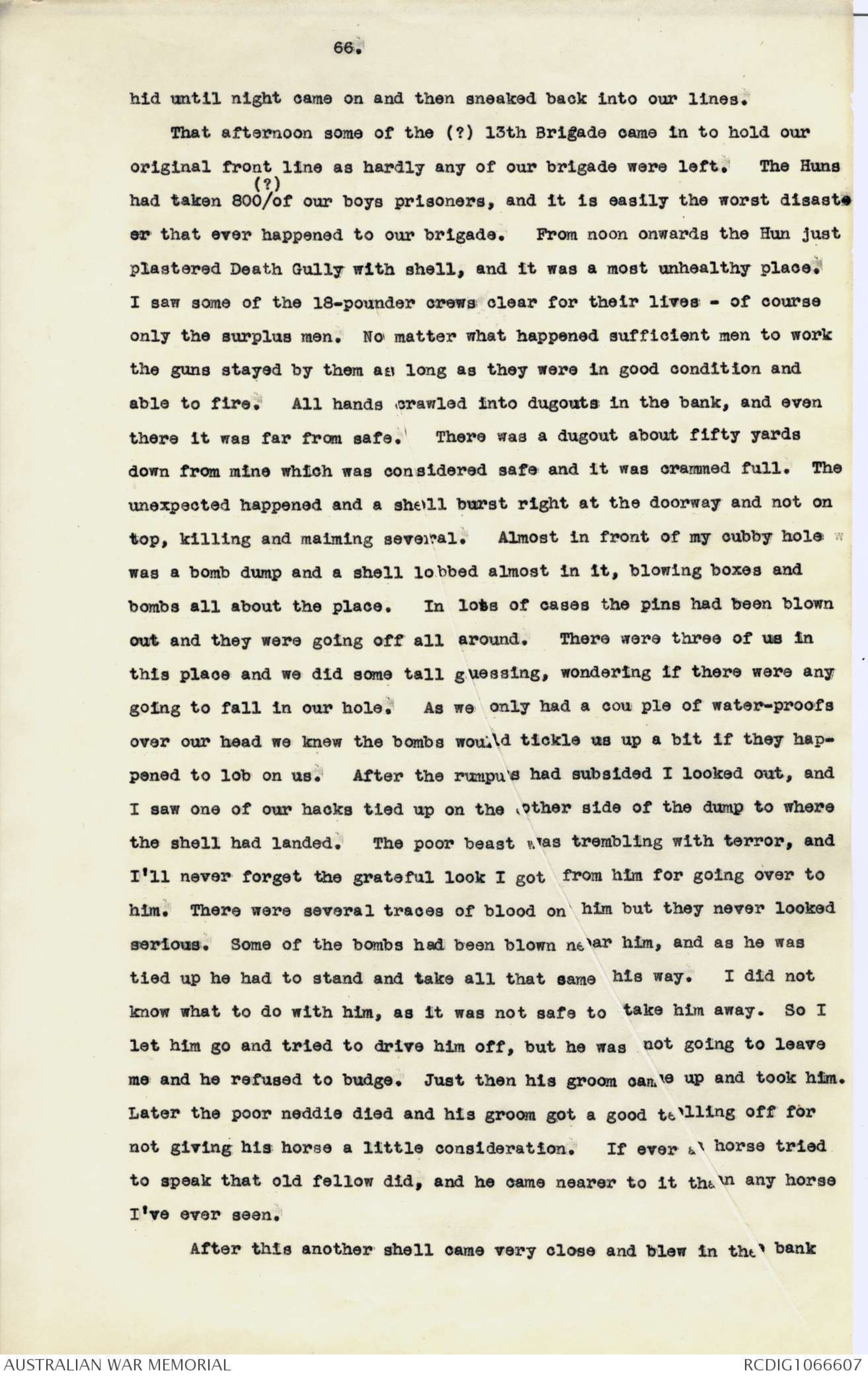
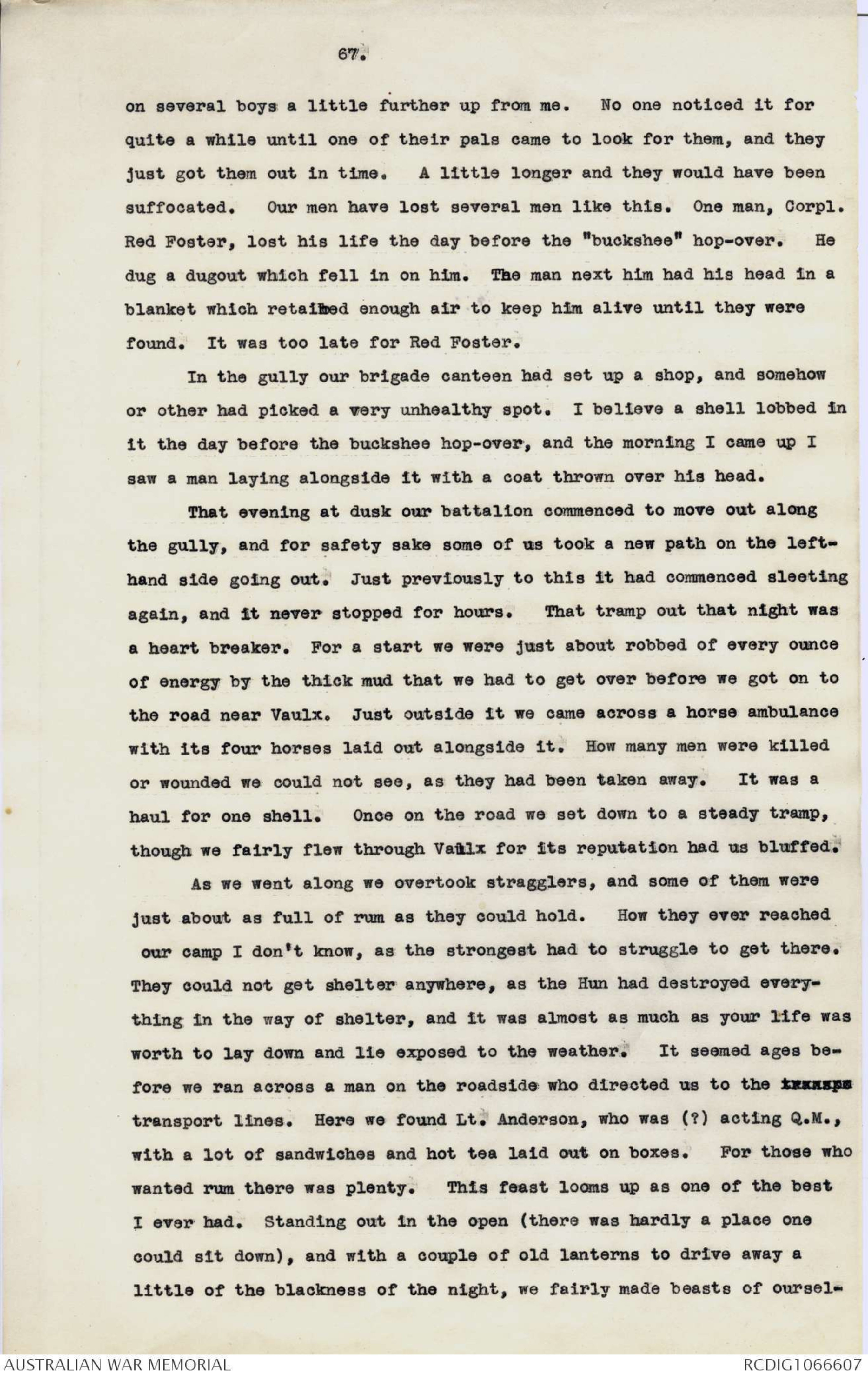
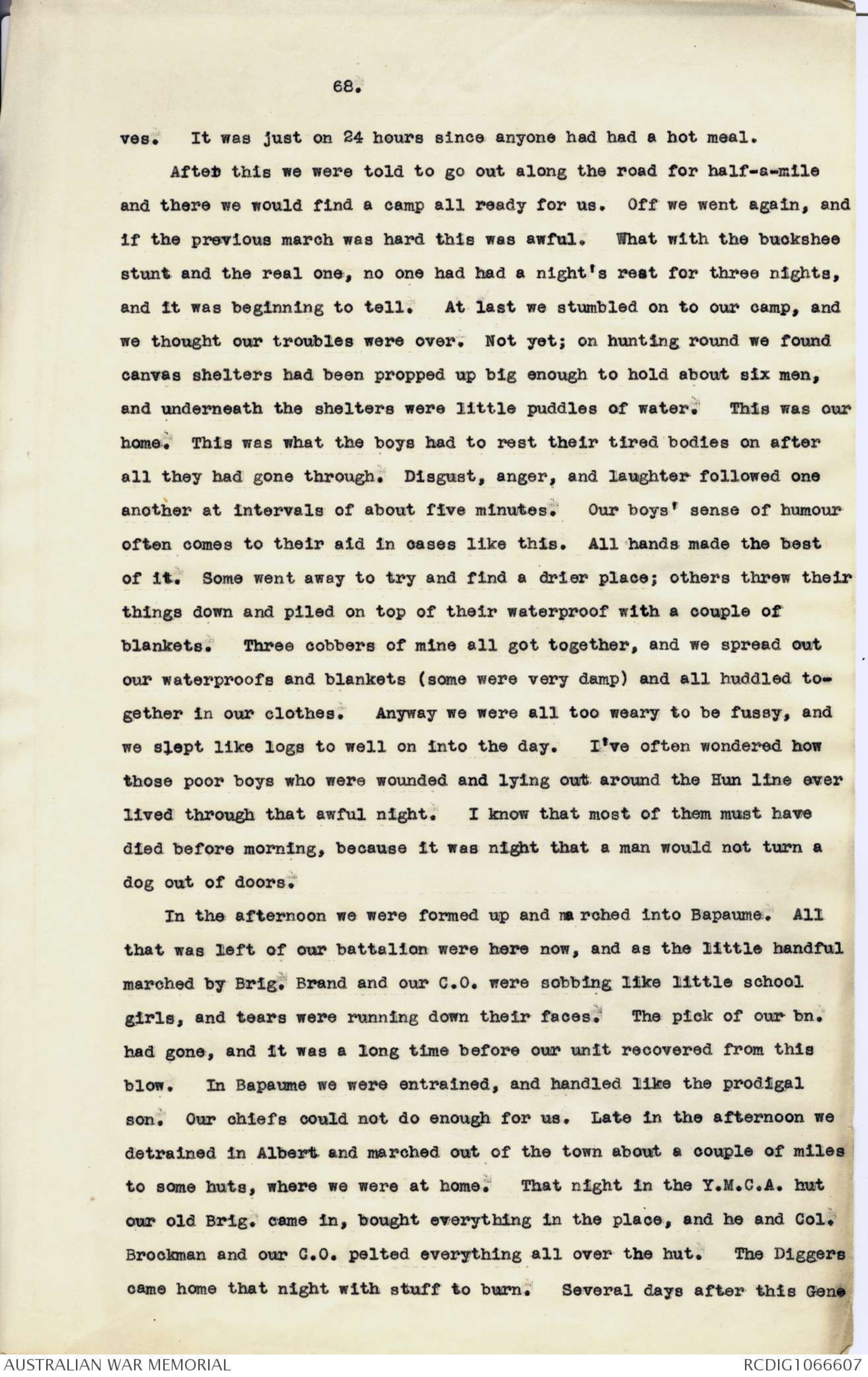
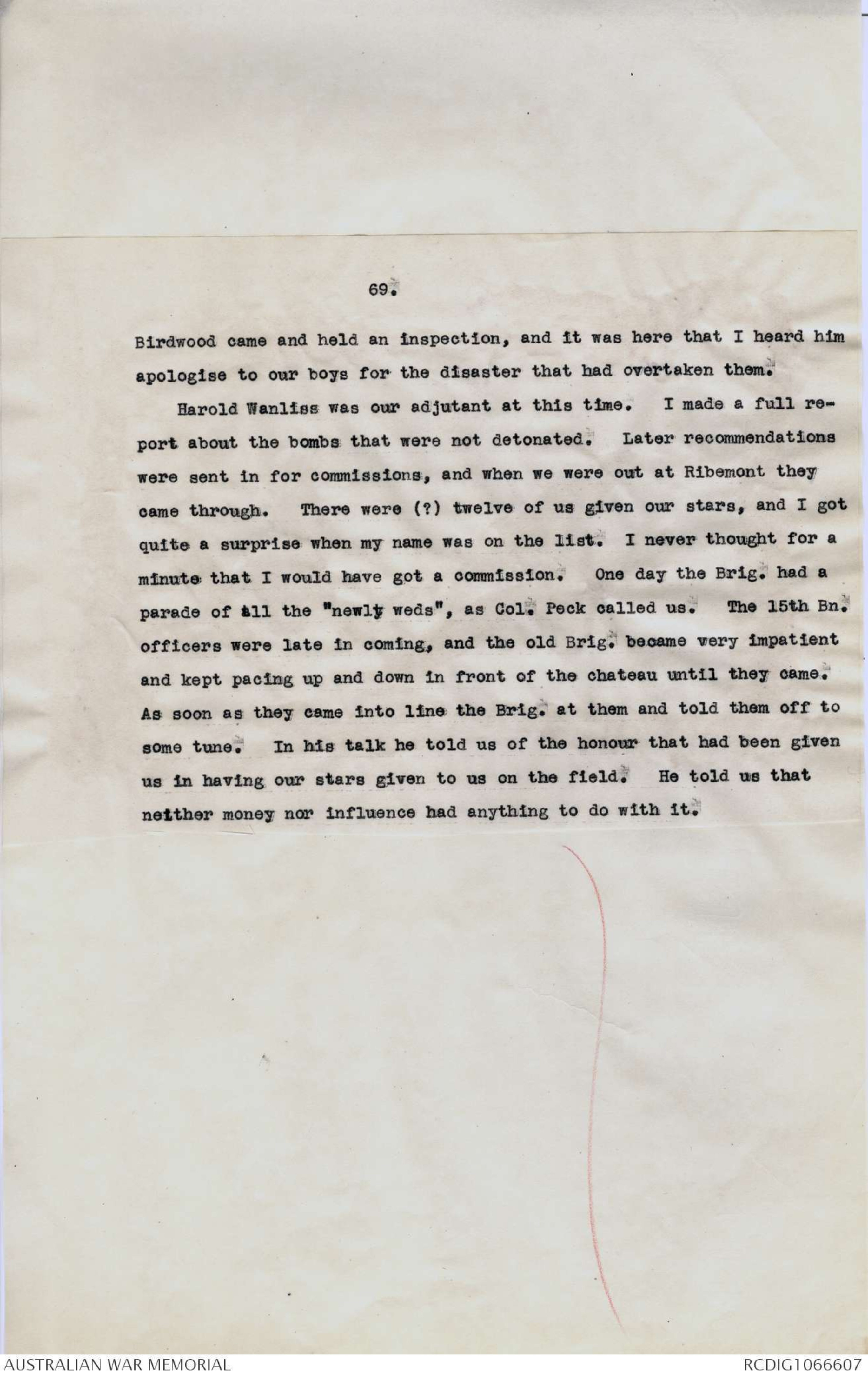
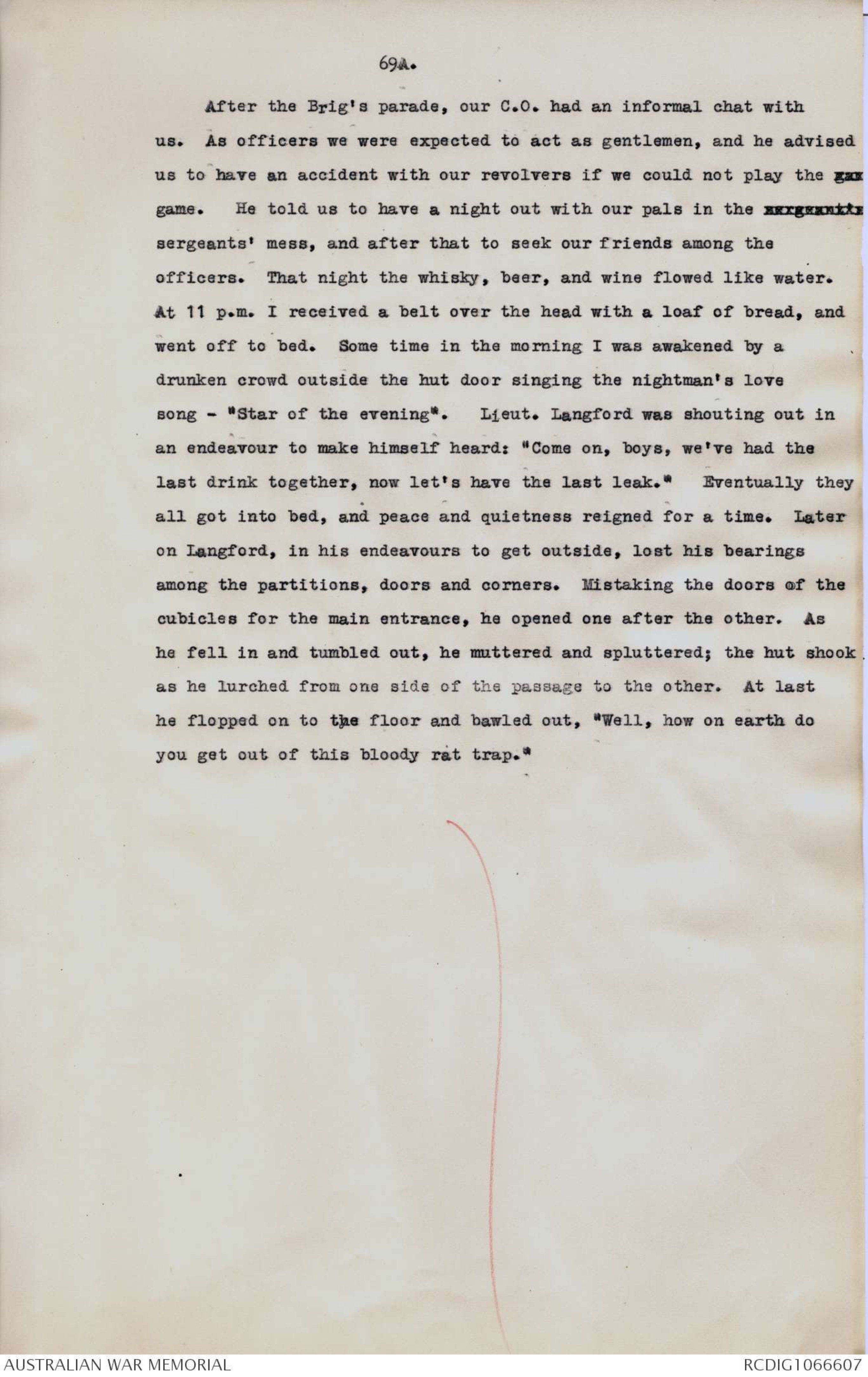
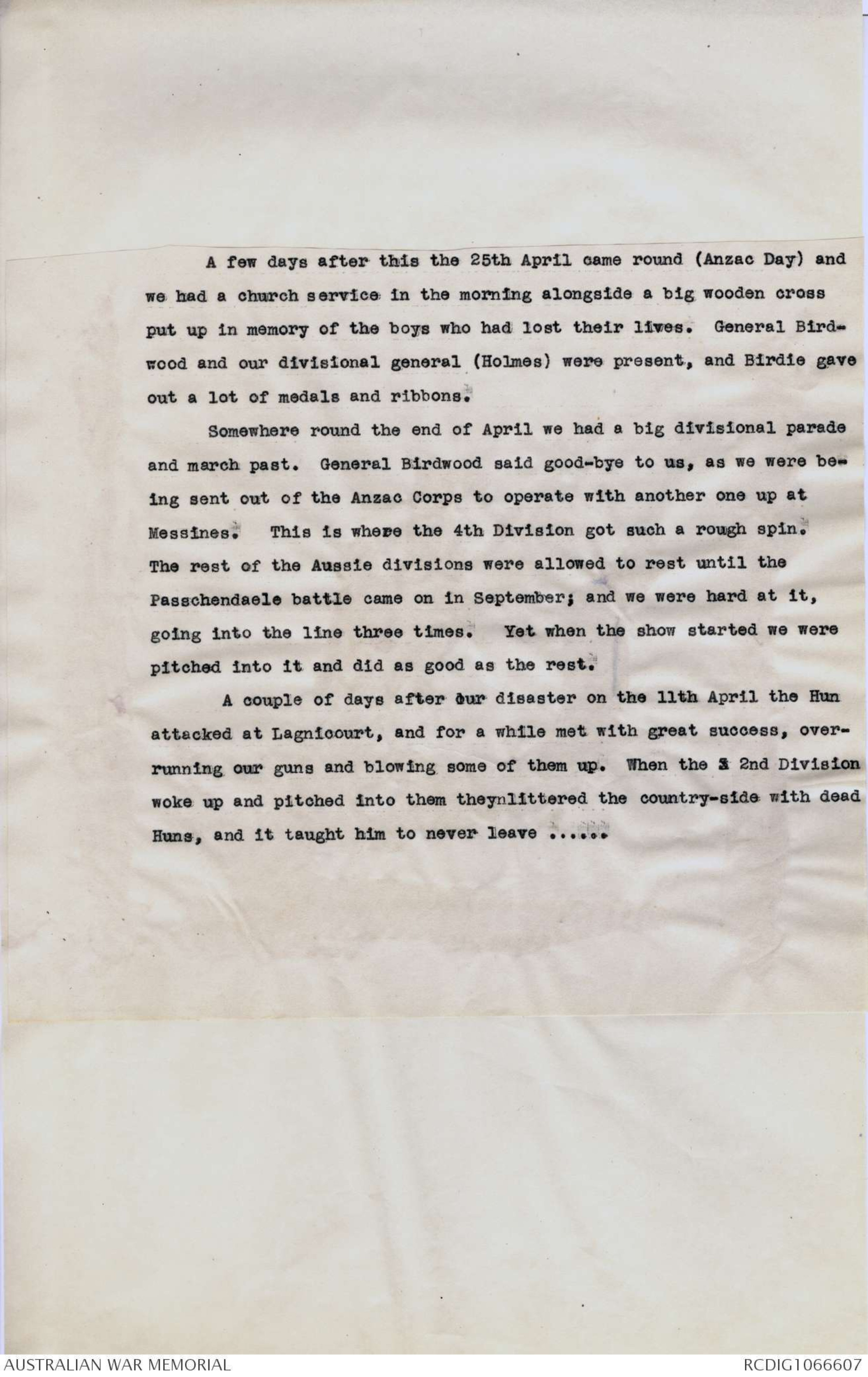
61.
feet away. When he was almost on them I left and cleared to the rear
for protection against the coming rumpus, but strange to say the tank
just squashed a couple of boxes down into the earth and nothing happened.
When the tank had passed I started in to sort out the bombs, and
I noticed that one or two had no detonators in them. This made me suspicious
and in going through the lot I found about twenty out of about
sixty boxes undetonated. To think that these were the things that
men would have to fight for their lives with made me furious,
through someone's negligence in not detonating them. As I was picking
them,out and putting them on one side Captain Stanton came along and
asked me if I'd seen any of his company, evidently he had lost some of
them. As the bank was deserted I soon convinced him - I was the only
one there. Just before zero 5.20 (? 4.45) I had a bit of a spell and
tried to take an impartial view of the show, and the only thing that I
did not like was the unearthly quietness and absence of Very lights
from Reincourt. Not a light was to be seen, whereus over Bullecourt
the Hun was making his usual display. Bullecourt was the objective of
the 12th Brigade and ours was Reincourt. Reincourt was perched away
up on a hill and to get to it our boys had to go up a slope. Bullecourt
was on our left and much xlowerx lower. To get to Reincourt our
boys were subjected to enfilade fire from the 12th Brigade front.
Apart from these little details I still had the greatest confidence.
Just about zero time a company of the 12th Brigade came in along the
bank and went over the top making towards the left.
At zero I saw the tanks waddle out and our boys follow them at a
distance of about a hundred yards or so. The tank right in front of
me got ditched almost as soon as they started and the boys went on and
left it. By what I saw of these fellows after it was a toss up whether
they did it intentionly of through negligence. Our guns opened at
the same time, but not a shell was to be seen bursting on the Hun lines.
Pretty soon the Hun opened with artillery and machine guns and theway
the bullets flew around was a caution. I ducked more than once as
sparks of fire were flicked up in front of our trench. The Hun commenced
to put up lights now, and during one lot that lit the place up like
day I saw a sight that I'll never forget. Advancing up the side of the
62.
slope as if they were on parade, with their rifles held at the high
port, was a line of our boys. I think that they were the third wave,
with gaps here and there and one or two places big spaces. With
such intense machine-gun fire there was no need to inquire what was
happening. When the lights died down the scone was closed, and they
were lost in the gloom.
I thought that I was all on my own until I went for a bit of a
walk under the bank. In a dugout I found a 12th Brigade cold-footer
who had funked it at the last minute. He had such a plausible tale
that I did not tumble to him till afterwards. As daylight came the
first thing that we saw was tanks in every place but where they were
wanted. There was only one who was doing his job, and he was over
the Hun trenches on the outskirts of Reincourt and working along to
the right. Even this one when he went a few hundred yards headed
back to the rear. The one out in front of me was still stuck in a
shellhole and its crew were tinkering around it. Later another tank
came to its assistance, instead of attending to its duty. Another
was between Bullecourt and Reincourt and, as I watched it, it started
to move towards the Hun wire. As it got on to it, it burst out in
flames and I never saw a man get out of it. Another was making its
get-away when a shell burst at its side. I saw the crew flop out one
at a time and run for dear life. Several others were burning fiercely
and belching out dense clouds of black smoke. They seemed as if
they burned for hours. What with one thing and another, not a tank
escaped. One did get back past Noreuil I believe, but a shell got it
even there. Their work had been of the most unsatisfied kind, and
they never got the least sympathy. Right up until 4th July 1918
stunt at Vaire Wood, where they redeemed their name, the word tank
brought forth abuse and curses from every Australian; and at one time
I belei ve they were thinking of doing away with them. It was not
the tanks' fault; it was the chicken hearts that manned them.
Later on a couple of English officers came round, and they were
very dubious about the stunt. As I could not see any Aussies about
the top I knew that they were in the Hun trenches, and I remember
telling them that once our boys got in they'd take some driving out.
As we were sitting up watching things a Hun over in Bullecourt must
63.
have seen us, and he turned his machine-gun on us. They got away all
right, but, for an hour after that if I showed my head, over would come
a shower of bullets. Every now and then I saw a few diggers get out
of the Hun trench and bolt for our lines, and I also saw about thirty
Hun prisoners come backon their own. When they came near the bogged
tank they approached it with hands reaching for the stars. They seemed
amazed at the thing. One boy came by me and when he had gone
about a hundred yards a shell burst right alongside him. Down he went
like a log. Several of us were on the point of going out for him when
a man close handy ran and picked him up and brought him back to the embankment.
They had barely got fifty yards away when another shell
burst in the same spot. If it had been left to us to go and get him
we would have been just about picking him up when the second one came,
and most likely have received the same dose.
An hour or so after daylight I saw some cavalry scouts going forward.
They were in full fighting togs, and the amount of stuff hanging
on to them and their horses was enormous. Poor beggars, I did pity
them because they never had a ghost of a hope, and they very soon got
it in the neck. Of course by this time we all knew that something
was wrong, and we got a goodidea how many enemy machine-guns were working
by the way they let go at one of our aeroplanes who went over to
size the stunt up. It seemed as if there were that many bullets in
the air that they must have all got wedged together. As time went on
I got as hungry as a hunter, and as I could see no one who knew anything
I made up my mind to go back to Noreuil and find out what was
happening, and also to get something to eat. By this time it was gett
getting on to midday, and I had not long to wait before several boys
came back who told us the most awful things imaginable. When a few
more came back we got a good line up of what ^had happened.
When zero hour came and the first wave went off they very soon
overtook the tanks, which were floundering around. Some of them even
fired on our own men, and goodness knows how many of our boys they
killed. As it was fatal to hesitate and wait for the tanks, the line
advanced alone. Just as soon as they came in sight of the Huns the
massacre commenced, and the Huns just lined their parapet and shot our
boys down like rabbits. Lots of them reached the wire, but as it had
64.
not been cut they simply had to run along it until they came to an
opening. By turning to a flank it bunched everyone together, and our
boys fell in heaps on the wire and in front of it. How on earth any
of them ever got in is a mystery. But get in they did and took his
front line. By this time the first and second waves were mixed up,
and as the second wave had to take the second trench it was a job to
tell who was second wave and who was first. Those who did attempt
it were shot through the head as soon as they showed themselves. It
was here that Captain Williamson was last seen. He got out of the
first trench and with revolver in his hand was making for the second
trench all by himself. How he met his death no one knows. For a
long while afterwards there were rumours that he had been taken prisoner,
but those who knew him best knew that Lofty would rather die
than be taken by the Huns. He used to say so himself. If he had
been given a chance I know that a few Huns would have breathed their
last before they outed him. I have heard men say that he showed bad
judgment in getting out the way he did, and that his place was to get
others to get out first. I'm positive that Lofty did the only thing
left for him to do. When Where a leader like Lofty goes, others will follow
99 times out of a hundred. He took a risk and it failed, but no
matter what he did it could not have been otherwise.
Captains Fred Stanton and Bob Orr were both killed in much the
same way, setting an example to their men. No matter what men like
these did, they could not overcome the obstacles put in their way by
Gough and his inefficient staff. After a while it developed into a
bomb fight up and down the trenches and C.T's. As no one could get
back to the rear for supplies without being shot at at close range it
cut off all hope of help, and it was just a case of whose bombs could
hold out the longest. The Hun could get all he wanted, and it was not
long before the fact began to tell. Our boys used up all they had,
then used up the Hun bombs also, and at the last they were searching
the dead to find them.
Murray, V.C., of the 13th was here, there, and everywhere, and
when at last he saw that it was a forlorn hope he gave the order -
everyone for himself. There were lots who never heard it and fought
65.
on until surrounded by Huns who came in on them from the rear ^and the
sides. Those who tried to get away were shot down like flies, and it
was only the foxy ones who used their heads who got out. Lots got out
so far and laid in shellholes until darkness set in. Those who laid
dogo too close to the Hun line were afterwards collected and sent back
to Hunland. Of course there were no end of wounded who were helpless
and the dugouts were full of them. One man deserves mentioning, and
he was John Snuggs. When it was everyone for himself he refused to
go and stayed with the wounded.
A little while before this the battalion received a lot of new
officers from Australia, and every one, excepting Captain Mitchell
was taken prisoner or killed - mostly prisoners. The only officer
who came out of the show with a whole skin was Captain Wadsworth (?).
I'm speaking of those who got into the enemy line. It was such a
mix-up that men of different battalions were mixed up hopelessly, and
there are no end of men who died and not a man who knew who they were.
There were deeds done that earned V.C's but in the confusion
they were overlooked. The 16th Battalion all gave the palm to a
14th corporal who acted like a super-man. Whom he was no one knew,
and we never found out. Men like that never lived long thatday.
After the Hun had recovered his trenches (this he managed after
about three hours) he began collecting our fellows who lay all over
the place. In some cases the Huns put water-proofs over them to protect
them from the awful weather, and some of our stretcher-bearers
were shown the way to where some lay, and to hear the collective talk
of the S.B's it showed that they received some assistance from the
Huns, and were shown a lot of consideration. Of course this only
applied to badly wounded men laying out in front of the wire. When
the S.B's finished their work they all firmly believed that they left
no one out this side of the Hun wire, apart from the dead. Some of
those behind the Hun line who were helpless were left out until next
day, and how they ever lived through the night is a mystery because
it snowed and sleeted and was bitterly cold. Several boys who have
returned from Germany have told us this. Lots of those who were
taken prisoner were marched back through Reincourt and got into our
own barrage, getting a rough handling. Two boys who were sent back
66.
hid until night came on and then sneaked back into our lines.
That afternoon some of the (?) 13th Brigade came in to hold our
original front line as hardly any of our brigade were left. The Huns
had taken 800 ^(?)of our boys prisoners, and it is easily the worst disaster
that ever happened to our brigade. From noon onwards the Hun just
plastered Death Gully with shell, and it was a most unhealthy place.
I saw some of the 18-pounder crews clear for their lives - of course
only the surplus men. No matter what happened sufficient men to work
the guns stayed by them as long as they were in good condition and
able to fire. All hands crawled into dugouts in the bank, and even
there it was far from safe. There was a dugout about fifty yards
down from mine which was considered safe and it was crammed full. The
unexpected happened and a shell burst right at the doorway and not on
top, killing and maiming several. Almost in front of my cubby hole
was a bomb dump and a shell lobbed almost in it, blowing boxes and
bombs all about the place. In loss of cases the pins had been blown
out and they were going off all around. There were three of us in
this place and we did some tall guessing, wondering if there were any
going to fall in our hole. As we only had a cou ple of water-proofs
over our head we knew the bombs would tickle us up a bit if they happened
to lob on us. After the rumpus had subsided I looked out, and
I saw one of our hacks tied up on the other side of the dump to where
the shell had landed. The poor beast was trembling with terror, and
I'll never forget the grateful look I got from him for going over to
him. There were several traces of blood on him but they never looked
serious. Some of the bombs had been blown near him, and as he was
tied up he had to stand and take all that same his way. I did not
know what to do with him, as it was not safe to take him away. So I
let him go and tried to drive him off, but he was not going to leave
me and he refused to budge. Just then his groom came up and took him.
Later the poor neddie died and his groom got a good telling off for
not giving his horse a little consideration. If ever a horse tried
to speak that old fellow did, and he came nearer to it than any horse
I've ever seen.
After this another shell came very close and blew in the bank
67.
on several boys a little further up from me. No one noticed it for
quite a while until one of their pals came to look for them, and they
just got them out in time. A little longer and they would have been
suffocated. Our men have lost several men like this. One man, Corpl.
Red Foster, lost his life the day before the "buckshee" hop-over. He
dug a dugout which fell in on him. The man next him had his head in a
blanket which retained enough air to keep him alive until they were
found. It was too late for Red Foster.
In the gully our brigade canteen had set up a shop, and somehow
or other had picked a very unhealthy spot. I believe a shell lobbed in
it the day before the buckshee hop-over, and the morning I came up I
saw a man laying alongside it with a coat thrown over his head.
That evening at dusk our battalion commenced to move out along
the gully, and for safety sake some of us took a new path on the left-hand
side going out. Just previously to this it had commenced sleeting
again, and it never stopped for hours. That tramp out that night was
a heart breaker. For a start we were just about robbed of every ounce
of energy by the thick mud that we had to get over before we got on to
the road near Vaulx. Just outside it we came across a horse ambulance
with its four horses laid out alongside it. How many men were killed
or wounded we could not see, as they had been taken away. It was a
haul for one shell. Once on the road we set down to a steady tramp,
though we fairly flew through Vaulx for its reputation had us bluffed.
As we went along we overtook stragglers, and some of them were
just about as full of rum as they could hold. How they ever reached
our camp I don't know, as the strongest had to struggle to get there.
They could not get shelter anywhere, as the Hun had destroyed everything
in the way of shelter, and it was almost as much as your life was
worth to lay down and lie exposed to the weather. It seemed ages before
we ran across a man on the roadside who directed us to the transpo
transport lines. Here we found Lt. Anderson, who was (?) acting Q.M.,
with a lot of sandwiches and hot tea laid out on boxes. For those who
wanted rum there was plenty. This feast looms up as one of the best
I ever had. Standing out in the open (there was hardly a place one
could sit down), and with a couple of old lanterns to drive away a
little of the blackness of the night, we fairly made beasts of ourselves.
68.
It was just on 24 hours since anyone had had a hot meal.
After this we were told to go out along the road for half-a-mile
and there we would find a camp all ready for us. Off we went again, and
if the previous march was hard this was awful. What with the buckshee
stunt and the real one, no one had had a night's rest for three nights,
and it was beginning to tell. At last we stumbled on to our camp, and
we thought our troubles were over. Not yet; on hunting round we found
canvas shelters had been propped up big enough to hold about six men,
and underneath the shelters were little puddles of water. This was our
home. This was what the boys had to rest their tired bodies on after
all they had gone through. Disgust, anger, and laughter followed one
another at intervals of about five minutes. Our boys' sense of humour
often comes to their aid in cases like this. All hands made the best
of it. Some went away to try and find a drier place; others threw their
things down and piled on top of their waterproof with a couple of
blankets. Three cobbers of mine all got together, and we spread out
our waterproofs and blankets (some were very damp) and all huddled together
in our clothes. Anyway we were all too weary to be fussy, and
we slept like logs to well on into the day. I've often wondered how
those poor boys who were wounded and lying out around the Hun line ever
lived through that awful night. I know that most of them must have
died before morning, because it was night that a man would not turn a
dog out of doors.
In the afternoon we were formed up and marched into Bapaume. All
that was left of our battalion were here now, and as the little handful
marched by Brig. Brand and our C.O. were sobbing like little school
girls, and tears were running down their faces. The pick of our bn.
had gone, and it was a long time before our unit recovered from this
blow. In Bapaume we were entrained, and handled like the prodigal
son. Our chiefs could not do enough for us. Late in the afternoon we
detrained in Albert and marched out of the town about a couple of miles
to some huts, where we were at home. That night in the Y.M.C.A. hut
our old Brig. came in, bought everything in the place, and he and Col.
Brockman and our C.O. pelted everything all over the hut. The Diggers
came home that night with stuff to burn. Several days after this Gene
69.
Birdwood came and held an inspection, and it was here that I heard him
apologise to our boys for the disaster that had overtaken them.
Harold Wanliss was our adjutant at this time. I made a full report
about the bombs that were not detonated. Later recommendations
were sent in for commissions, and when we were out at Ribemont they
came through. There were (?) twelve of us given our stars, and I got
quite a surprise when my name was on the list. I never thought for a
minute that I would have got a commission. One day the Brig. had a
parade of all the "newly weds", as Col. Peck called us. The 15th Bn.
officers were late in coming, and the old Brig. became very impatient
and kept pacing up and down in front of the chateau until they came.
As soon as they came into line the Brig. at them and told them off to
some tune. In his talk he told us of the honour that had been given
us in having our stars given to us on the field. He told us that
neither money nor influence had anything to do with it.
69A.
After the Brig's parade, our C.O. had an informal chat with
us. As officers we were expected to act as gentlemen, and he advised
us to have an accident with our revolvers if we could not play the gam
game. He told us to have a night out with our pals in the sergeants
sergeants' mess, and after that to seek our friends among the
officers. That night the whisky, beer, and wine flowed like water.
At 11 p.m. I received a belt over the head with a loaf of bread, and
went off to bed. Some time in the morning I was awakened by a
drunken crowd outside the hut door singing the nightman's love
song - "Star of the evening". Lieut. Langford was shouting out in
an endeavour to make himself heard: "Come on, boys, we've had the
last drink together, now let's have the last leak." Eventually they
all got into bed, and peace and quietness reigned for a time. Later
on Langford, in his endeavours to get outside, lost his bearings
among the partitions, doors and corners. Mistaking the doors of the
cubicles for the main entrance, he opened one after the other. As
he fell in and tumbled out, he muttered and spluttered; the hut shook
as he lurched from one side of the passage to the other. At last
he flopped on to the floor and bawled out, "Well, how on earth do
you get out of this bloody rat trap."
A few days after this the 25th April came round (Anzac Day) and
we had a church service in the morning alongside a big wooden cross
put up in memory of the boys who had lost their lives. General Birdwood
and our divisional general (Holmes) were present, and Birdie gave
out a lot of medals and ribbons.
Somewhere round the end of April we had a big divisional parade
and march past. General Birdwood said good-bye to us, as we were being
sent out of the Anzac Corps to operate with another one up at
Messines. This is where the 4th Division got such a rough spin.
The rest of the Aussie divisions were allowed to rest until the
Passchendaele battle came on in September; and we were hard at it,
going into the line three times. Yet when the show started we were
pitched into it and did as good as the rest.
A couple of days after our disaster on the 11th April the Hun
attacked at Lagnicourt, and for a while met with great success, overrunning
our guns and blowing some of them up. When the 3 2nd Division
woke up and pitched into them theynlittered the country-side with dead
Huns, and it taught him to never leave ......
 Julie*
Julie*This transcription item is now locked to you for editing. To release the lock either Save your changes or Cancel.
This lock will be automatically released after 60 minutes of inactivity.